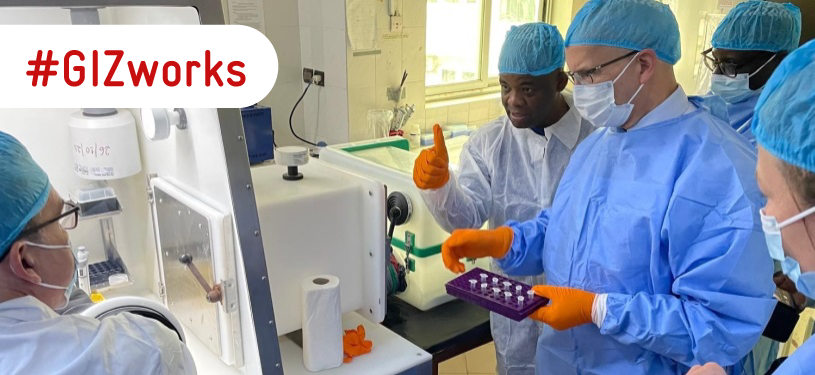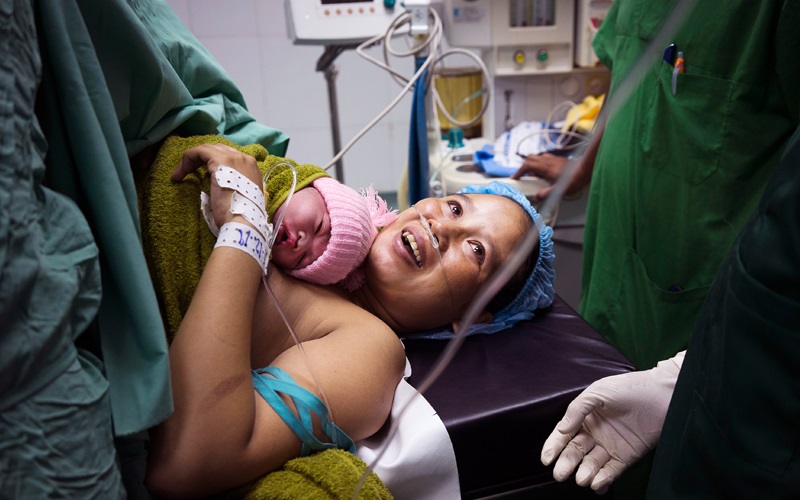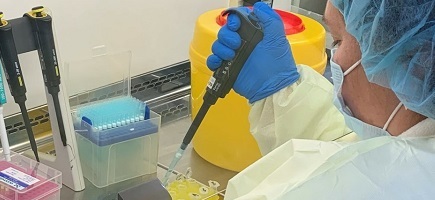
20.09.2024
Tackling mpox with a new test and training courses
GIZ and Charité are enabling the reference laboratory in Benin to comprehensively diagnose poxviruses for the first time. Early detection of the viral disease helps Germany too.

A new test aims to slow the advance of the mpox virus. The national reference laboratory in Benin is the first of its kind in the world to use this test, and has been doing so since September. The test was designed and brought to Benin by the Deutsche Gesellschaft für Internationale Zusammenarbeit (GIZ) GmbH and Charité – Universitätsmedizin Berlin. Benjamin Hounkpatin, Benin’s Minister of Health was on hand to witness the laboratory’s first diagnoses: ‘The new test is important for us in Benin, but also for preventive health care worldwide,’ he says. ‘Only by detecting illnesses can we prevent them from spreading – and save people’s lives. Thanks to our longstanding partnership with GIZ and Charité, we are able to respond rapidly.’
There are two particular features of the test. First, it indicates infection with mpox and all other poxviruses – including novel virus variants (clades) that spill-over from animals or mutations – with just a single analysis. In the case of mpox, it immediately detects the dangerous clade 1b, for example. This was previously a laborious process. In structurally weaker regions in particular, new pathogens are often identified too late to prevent them from spreading globally. Second, the test is resistant to changes in temperature and is optimised for use in the tropics. This means that it can be supplied to regional hospitals without impairing any loss in quality.
German Epidemic Preparedness Team (SEEG) assigned to the Democratic Republic of the Congo (DRC)
Microbiologist Michael Nagel was already involved in 2014 when the laboratory in Benin was founded with German support. Since 2016, on behalf of the German Development Ministry, he has expanded the facility into a reference laboratory for haemorrhagic fevers with GIZ's Epidemic Preparedness Team (SEEG). Today, Nagel is leading the International Alliance against Health Risks in Wildlife Trade and is working together with Berlin’s Charité hospital to search for animal viruses. ‘Thanks to the preparatory work of the last ten years, test development has now been rapid,’ explains Nagel. Trained staff on the ground, concerted action on the part of laboratories in the region, and the team of scientists around Jan Felix Drexler from the Charité’s Institute of Virology, all played a pivotal role: ‘We have made sure that laboratories in Africa are networked and that access was made available to a modern and reliable diagnostic tool,’ explains Nagel.
Urgent support is now also provided by the German Epidemic Preparedness Team (SEEG) at GIZ. The SEEG is sending a team to eastern DRC – the focal point of the current mpox outbreak – at the end of September. Over one week, the experts will train staff from a number of hospitals and health facilities on how to manage mpox. This is because an increased number of health workers have recently become infected. Healthy and well protected specialist staff in hospitals are vital when it comes to treating patients and containing the current wave of the disease. Here, the SEEG works closely with a pandemic prevention unit of the East African Community that GIZ has helped to set up in recent years.




